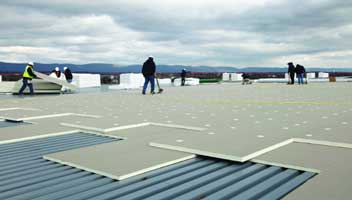Green tie-ups: Covestro to supply Carlisle Construction biocircular MDI for PU building insulation; VTT/Lut Uni open CO2-based plastics pilot plant in Finland

Buildings and the built environment account for nearly 40% of energy use in the US. Architects, builders and building owners know that energy efficiency is a critical component of a sustainable future. To that end, German materials firm Covestro and Carlisle Construction Materials (Carlisle) are collaborating to bring bio-circular products to the construction industry.
Covestro will supply Carlisle with methylene diphenyl diisocyanate (MDI) that is based on ISCC PLUS certified mass balanced bio-circular raw materials and features up to a 99% lower product carbon footprint than fossil-based MDI. It specifically has a CO2 reduction potential of 2.4 kg per kg of MDI produced. This will enable Carlisle to produce its polyiso insulation boards with lower embodied carbon.
The collaboration between Covestro and Carlisle extends a legacy of joint innovation in the construction industry that spans decades. As sustainability targets for the built environment stand to increase, the two companies are prepared to develop and introduce the next generation of insulation materials.
Covestro will supply its Mondur CQ 489 MS isocyanate to Carlisle. The CQ, or “Circular Intelligence” designation represents a broad family of Covestro’s circular products with an attribution of at least 25% alternative raw materials derived from biomass or recycled plastics.
Carlisle Construction Materials aims to be net zero by 2050. Carlisle will produce its bio-based rigid foam insulation, which contains 5% bio-circular content, for the SynTec, Versico, Hunter Panels and WeatherBond brands. This bio-based insulation is the latest addition to Carlisle Construction Materials' portfolio of sustainable building products.
Covestro has ISCC PLUS certified facilities in every major global market, including its manufacturing facility in Baytown, Texas. In support of its vision to be fully circular, Covestro aims to be operationally climate neutral (scope 1 and scope 2) by 2035 and climate neutral for scope 3 by 2050. The company currently has hundreds of circular CQ products and is continuously expanding its product portfolio.

In other news, VTT Technical Research Centre of Finland, LUT University, and companies have opened a pilot plant in Espoo, Finland, to process captured carbon dioxide into compounds that can replace fossil raw materials in plastic products and chemicals. The pilot plant, built in sea containers, started operations in August. Renewable energy, the hydrogen economy and bio-based carbon dioxide emissions from industrial sectors open significant opportunities for Finland to create new sustainable industrial activity.
Finland wants to utilise bio-based carbon capture as one way of reducing greenhouse gas emissions. For example, the Government Programme aims to significantly increase the use of technological carbon sinks.

The Forest CUMP research project of VTT and LUT University has investigated how bio-based carbon dioxide from, for example, the forest industry and waste incineration can be captured and converted into high-value products such as polypropylene and polyethylene. The promising results will now be put into practice as VTT and its partners open a pilot plant built in sea containers in the Bioruukki pilot centre in Espoo, Finland.
Juha Lehtonen, Research Professor at VTT, says, "Finland produces around 30 million tonnes of bio-based carbon dioxide per year. If captured and converted into products, Finland could become a major producer and exporter of polymers and transport fuels made from carbon dioxide and hydrogen."
Polypropylene and polyethylene are the most common plastic types used in everyday life, which are currently mainly produced from fossil raw materials. Plastics play an important role in sequestering carbon dioxide in long-lasting products.
"The technology creates a significant export opportunity for renewable high-value-added products. Due to its extensive forest industry, Finland has a huge potential to utilise bio-based carbon dioxide. Outside the Nordic countries, large sources of bio-based carbon dioxide are rare," Lehtonen says.
The Forest CUMP project is implemented in close cooperation with business partners as part of Business Finland's Veturi ecosystem, which supports sustainable development. One of the Veturi companies is Borealis. Forest CUMP is part of Borealis' SPIRIT programme, which promotes the green transition of the plastics industry.
"This is a significant development project to support our vision of capturing and utilising industrial carbon emissions by producing long-lasting or fully recyclable plastic products that can sequester carbon for a long time," says Ismo Savallampi from polymer firm Borealis.
The research project has studied the entire production chain from carbon capture to ethylene and propylene production. Ethylene and propylene are the raw materials for polyethylene and polypropylene. At this stage, they are produced at VTT Bioruukki from flue gas carbon dioxide. In the future, the technology can be brought into production wherever bio-based carbon dioxide is produced, such as in forest industry or waste incineration plants.
The Forest CUMP project, funded by Business Finland, is part of the Business Finland Veturi ecosystem, which develops various solutions towards sustainable development and national carbon neutrality together with major Finnish companies. The project started in August 2022 and will run until the end of 2024. The project involves companies like Borealis, Neste and ABB, as well as Metsä Spring, Kemira, Vantaa Energy, Stora Enso, Kleener Power Solutions, Carbonreuse Finland, Fortum and Essity. In addition to VTT, LUT University is a research partner.
(PRA)SUBSCRIBE to Get the Latest Updates from PRA Click Here»







